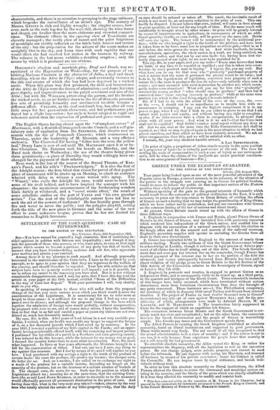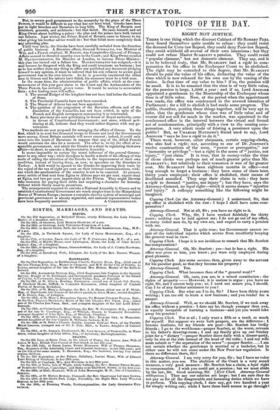GREECE UNDER THE EUROPEAN GUARANTEE.
TO THE EDITOR OF THE SPECTATOR.
Athens, 27th August 1841.
Your paper being looked upon as one of the most powerful advocates of the Popular cause in Europe, a correct account, in its columns, of the situation of the parties in the struggle now carrying on in Greece for political freedom, would do more to inform the public on that important section of the Easter's question than whole pages of controversy. Without speaking of the gain to the general interests of humanity which would result from the extension of political civilization in the East, it is only necessary to point out the importance to Great Britain of settling the affairs of Greece on such a footing that we may resign the guardianship of King OTHO, which we have rather rashly undertaken, and put our connexion with Greece on the common footing of the law of nations and direct treaty. At present, Great Britain stands mixed up with the affairs of Greece in three different ways. I. England, in conjunction with France and Russia, placed Prince OTHO of Bavaria on the throne of Greece, and furnished him with pecuniary resources which rendered him independent of the Greek nation, and enabled him to dispense with the convocation of a national assembly to ratify his election to the kingly office and fix the amount and sources of the national revenues. England's pecuniary supplies still operate in excluding the Greeks from all share in their own Government.
2. Greece has contracted debts in England to the amount of nearly three millions sterling. Nearly two millions of this the Greek Government refuses to acknowledge at London, though it enforces by legal process at Athens pay- ment of all claims due to itself arising out of this debt. The Greek Govern- ment does not even pay the interest due on the remainder, though France has received payment of the interest due to her on the portion of the debt she advanced; and money subsequently borrowed from Bavaria has been paid in direct violation of the pledge given to Great Britain in the 6th Section of the 12th Article of the Convention relative to the Sovereignty of Greece, signed at London May 7th 1832.
3. England, by protocols and treaties, is engaged to protect Greece as an independent State, and is consequently liable to be mixed up, as a third party, in the quarrels and intrigues of the Greek Court. Three remarkable instances of this danger have lately occurred, which have terminated without serious disturbance, more from fortuitous circumstances than from the foresight of any party concerned. These instances are-1. The Philorthodox conspiracy, the discovery of which in January 1840 saved Turkey and Greece from internal troubles. 2. The project of France to land twelve thousand men in Greece* to counteract any attempt of ours against MEHEMET ALI; and for the pro- visioning of which, arrangements were made by Admiral HUGON, M. DE LACRENE, and M. MARCHETTI. 3. The insurrection lately suppressed in Crete for the support of which an expedition left Greece. The connexion between Great Britain and the Greek Government is cer- tainly much too close and complicated ; but on the other hand, the connexion between the Greek Government and the people of Greece is wonderfully simple. The Greeks pay taxes and the Government spends them. The Allied Powers in creating the Greek kingdom established an absolute monarchy, based on liberal institutions and supported by good government. These words sound very finely. The sad result of all this compound is, that the actual administration is in a state of anarchy; and if the nation is not in one too, it is only because from experience the people know that anarchy is not a safe remedy for bad government. To establish absolute monarchy, the Allies vested the King, or rather his representatives the Regency, with all the legislative as well as the executive power. He can change judges, seize private property, and cannot be sued before the tribunals. He can dispense with seeing his Ministers, and transact all business by means of his private secretaries : hence his Cabinet is called the Camara's. He can impose taxes by royal ordinance, and banish indi- viduals without trial.
In order to base this absolute monarchy on liberal institutions, the Allied Powers allowed the Greeks to retain the communal and municipal system ex- isting in the country, and the liberty of the press which was already established. It is true they allowed the monarchy to modify and restrict both.
• This fact rests not solely on the assertion of M. Timms in the Chamber, but its proved by the memorials for indemnity presented to the French King in Council, and to the French Ministry of Finance by Mr. ltImicasrn himself. But, to secure good government to the monarchy by the grace of the Three Powers, it would be difficult to say what has not been tried. Greeks have been put in tight breeches and Bavarians in long kilts. The King of Bavaria sent ministers, generals, and architects : but that failed. He came himself, and set King OTHO about building a palace : the plan and the palace have both turned out failures. Last winter, the Prince Royal of Bavaria came to Greece to try what giving his brother advice would do : but that failed more completely than say preceding plan. Until very lately, the Greeks have been carefully secluded from the direction of public business. A Bavarian officer, General Sensisi.rz, was Minister of War, and a French employe, M. REGNY, was Comptroller-General of Finance. Affairs seemed to threaten anarchy even to the Court ; and King &rim recalled M. MAOROCORDATOS, his Minister Minister at London, to become Prime Minister: this plan has turned out a failure too. MAUROCOHDATOS has resigned,—it is said bemuse he disagreed with the King and could terminate no business ; but as he has neither done any thing in office nor published any document pledging himself to any opinion, it must be inferred that his sole reliance to secure good government was in his own talents. As he is generally considered the ablest man in Greece and his talents have failed, his successor must be a bold man.
In the mean time, the administration of public affairs, which at the com- mencement of this year gave alarm to the Court and the Ambassadors of the Three Powers, has certainly- grown worse. It would be useless to accumulate facts; a few leading ones will suffice. 1. The annual Budget of the kingdom has not been laid before the Council of State.
2. The Provincial Councils have not been convoked. 8. The Mayor of Athens has not been appointed. 4. The question of the resignation of the Bavarian officers, and of the dissolution of the Camarillo, has not been settled, in spite of the French and English newspapers announcing it as terminated. 5. Some provinces are now petitioning in favour of Royal authority, some in favour of Constitutional Government ; and some, without peti- tioning at all, indicate that they would rather dispense with any go- vernment.
Two methods are now proposed for arranging the affairs of Greece. To the first, which is to send five thousand troops to Greece and lend the Government more money, Great Britain certainly will never consent ; indeed, it could only enter into the heads of Bavarians to suppose that any of the Allied Powers would entertain the idea for a moment. The other is, to try the effect of re-
nsibIe government, and admit the Greeks to a share in regulating their own aflairs—in short, to convoke a Representative Assembly. It seems impossible to restore the moral influence of the general Govern- ment in any other way; while there:can be hardly a doubt of the efficacy of this mode of ailing the attention of the Greeks to the improvement of their own condition, instead of leaving them, as now, to speculate on the disorders in Turkey. A field would be opened to the Greeks for improving their trade by the repeal of the tax of eight per cent, on their internal communications, with- out which the amelioration of the country is not to be expected. At present, every article of food sent from Egina to Athens pays six per cent, export-duty at Egina, and two per cent, import-duty at the Pirwus. They might likewise take measures for paying their debts and acquiring a character for honesty, without which liberty must be precarious. The arrangements required to convoke a National Assembly in Greece and to eatablish Constitutional Government are much simpler than in the Monarchical States of Western Europe; because a complete elective system of municipal and provincial government is already organized, and national representative bodies



























 Previous page
Previous page